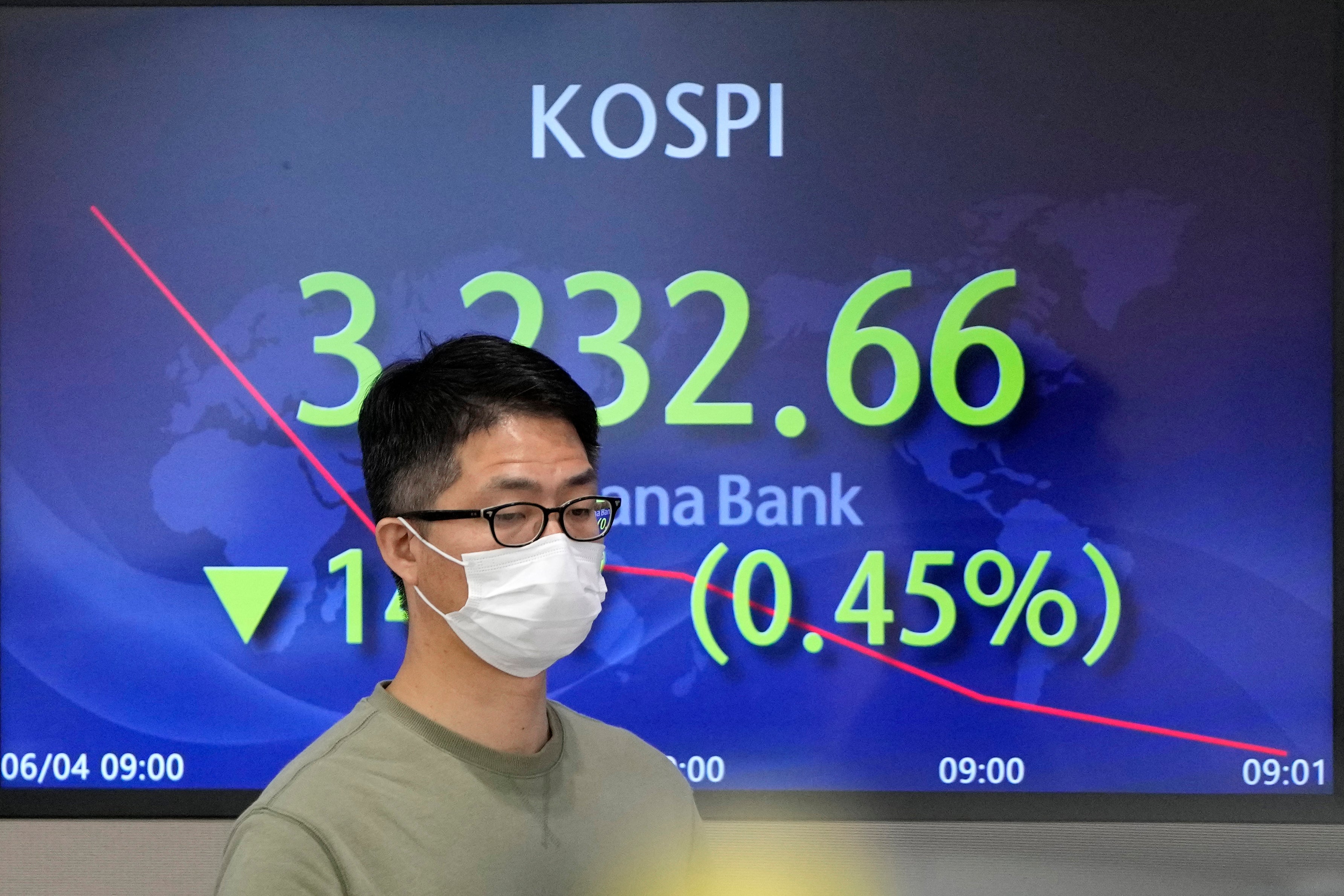Asian shares slip, dragged lower by Wall Street tech fall
Asian shares are mostly lower, dragged down by a decline in technology stocks on Wall Street

Your support helps us to tell the story
From reproductive rights to climate change to Big Tech, The Independent is on the ground when the story is developing. Whether it's investigating the financials of Elon Musk's pro-Trump PAC or producing our latest documentary, 'The A Word', which shines a light on the American women fighting for reproductive rights, we know how important it is to parse out the facts from the messaging.
At such a critical moment in US history, we need reporters on the ground. Your donation allows us to keep sending journalists to speak to both sides of the story.
The Independent is trusted by Americans across the entire political spectrum. And unlike many other quality news outlets, we choose not to lock Americans out of our reporting and analysis with paywalls. We believe quality journalism should be available to everyone, paid for by those who can afford it.
Your support makes all the difference.Asian shares mostly slipped Friday, dragged lower by a decline in technology stocks on Wall Street
Benchmarks fell in Tokyo Seoul, Shanghai and Hong Kong but rose in Sydney.
Traders are awaiting the U.S. government’s latest monthly jobs report, expected later Friday. Unemployment data announced Thursday was encouraging.
But while an improved jobs market suggests the economy is gaining momentum after the pandemic, investors are keeping a close eye on signs of inflation, which especially hurts the tech sector. The benchmark S&P 500 index dropped 0.4% on Thursday and is on track for a 0.3% weekly loss.
Japan's benchmark Nikkei 225 slipped 0.4% to 28,937.79. South Korea's Kospi lost 0.3% to 3,238.40, while Australia's S&P/ASX 200 rose 0.5% to 7,295.40. Hong Kong's Hang Seng fell 0.3% to 28,873.65 and the Shanghai Composite edged 0.1% lower, to 3,581.55.
“Asian markets will likely be in a holding pattern on Friday,” Prakash Sakpal and Nicholas Mapa, senior economists at ING, said in a report.
"More importantly, investors will await the US non-farm payrolls report out later tonight."
On Thursday, technology companies, whose pricey valuations make them more sensitive to inflation fears, were the biggest weight on the market.
The S&P 500 fell 15.27 points to 4,192.85. The Dow Jones Industrial Average dropped 0.1% to 34,577.04. The tech-heavy Nasdaq lost 1% to 13,614.51. The Russell 2000 index of smaller companies gave up 0.8% to 2,279.25.
Microsoft fell 0.6% and Apple lost 1.2%.
Retailers, hotel operators and a variety of other companies that rely on direct consumer spending also posted some of the biggest declines, as did communications companies. Etsy slid 5.4%, Tesla dropped 5.3%, Wynn Resorts fell 4.1% and Facebook lost 0.9%. Banks and health care companies rose.
AMC Entertainment slumped 17.9%, shedding gains from a brief rally, after the movie theater operator said it would sell more shares after a huge run-up in its stock price on a surge of interest from individual investors. The stock is still up about 2,300% this year.
General Motors jumped 6.4% after saying it expects earnings in the first half of the year to exceed its earlier forecasts after it did a better job of managing a global computer chip shortage than expected. Rival Ford Motor climbed 7.2% for the biggest gain in the S&P 500.
While falling unemployment numbers are encouraging, they also come with rising labor costs. Labor costs rose at a 1.7% rate in the first quarter, up from the initial estimate that they had fallen 0.3%. That could stoke more fears that inflation might run hotter than expected.
The jobs report Friday could provide more clarity on the economic recovery and the potential for higher inflation. Economists are projecting that it will show employers added 650,000 jobs in May.
Rising inflation is expected as the economy recovers from the pandemic's impact, but the key question for many on Wall Street is whether it will be temporary or more permanent.
“The main concern in the markets, rightfully so, is inflation,” said Cliff Hodge, chief investment officer for Cornerstone Wealth. “Data points are beginning to confirm the view that inflation is likely to be more sticky.”
The concern is that the global recovery could be hampered if governments and central banks have to withdraw stimulus to combat rising prices.
In energy trading, benchmark U.S. crude rose 4 cents to $68.85 a barrel in electronic trading on the New York Mercantile Exchange. It gave up 2 cents to $68.81 per barrel on Thursday. Brent crude, the international standard, added 2 cents to $71.33 a barrel.
In currency trading, the U.S. dollar weakened to 110.24 Japanese yen from 110.29 yen. The euro cost $1.2106, down from $1.2127.
___
Damian J. Troise and Alex Veiga contributed.
Yuri Kageyama is on Twitter https://twitter.com/yurikageyama
Subscribe to Independent Premium to bookmark this article
Want to bookmark your favourite articles and stories to read or reference later? Start your Independent Premium subscription today.